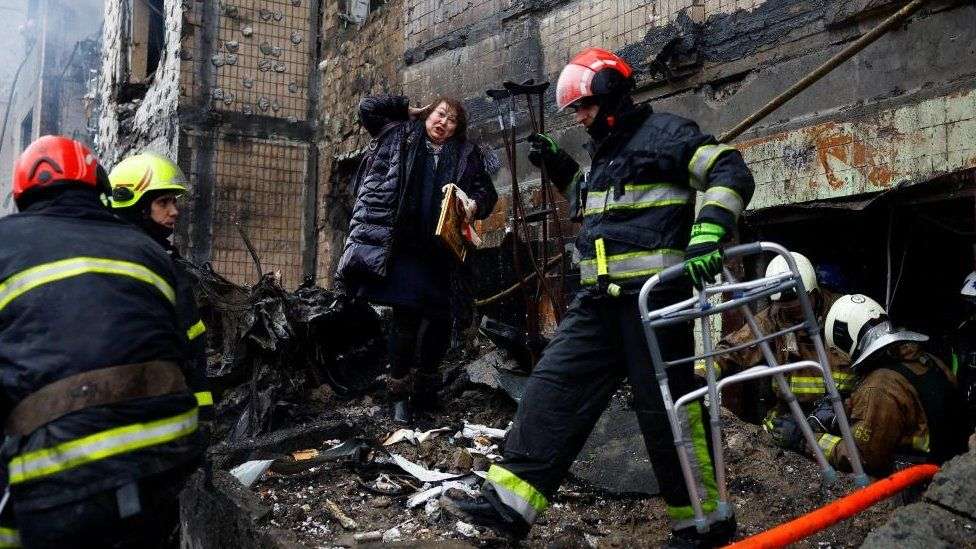There was a time when Prabowo Subianto's name would have spooked most Indonesians.
But now young voters appear to be charmed by the defence minister's slick makeover. The fiery ex-special forces commander dogged by allegations of human rights abuses and disappearances has become a cute grandfather made for memes.
"He is much older, but he is able to embrace my generation," says a 25-year-old supporter of his, Albert Joshua.
Now 72, Mr Prabowo is running to succeed the popular Joko Widodo when the world's third-largest democracy votes on 14 February. He is promising more of the stability and economic development Mr Widodo, or Jokowi as he is better known, pushed during his decade in power.
So far the polls put Mr Prabowo ahead of his younger rivals, Ganjar Pranowo and Anies Baswedan. Both men are in their 50s and have experience running key Indonesian provinces as governors. Job security, infrastructure and a bigger diplomatic role for Indonesia dominate their campaigns.
Mr Prabowo's running mate is Mr Widodo's eldest son, Gibran Rakabuming Raka. It's a choice that many see as a tacit blessing by the president, who is yet to endorse anyone, including his own party's candidate, Mr Pranowo.
But a Prabowo presidency is also alarming to many, who say he has never been held accountable for the alleged abduction and killing of pro-democracy student activists decades ago.
A young voter, who did not wish to be named, says she is "terrified" he will win: "If he could be an accomplice of silencing voices then he will be silencing those voices now if he gets elected."
"Cuteness" hardly makes an eligible leader, she says. "If that's how you think a leader should be, then you should elect kittens."
Indonesia's cat-loving 'gemoy squad'
Cats are also a part of Mr Prabowo's social media campaign. His brown and white stray, Bobby, has his own well-curated Instagram account that describes him as a "patriot".
Then there are the TikTok videos of Mr Prabowo doing his signature move - an awkward shuffle across the stage - or shooting hearts at the audience. The gushing response has dubbed him "gemoy", a moniker for all things cuddly and adorable. His young supporters call themselves the "gemoy squad".
Social media has been the cornerstone of his outreach. Millennials and Gen Z make up more than half of Indonesia's 205 million eligible voters - they also account for many of the 167 million Indonesians who use social media.
Mr Prabowo's official Facebook and affiliated accounts spent $144,000 in advertising over the past three months, according to Meta's data. That's almost double Mr Pranowo's spend, and triple that of Mr Baswedan.
"I rarely see Prabowo's real picture anymore," said Yoes C Kenawas, a research fellow at Atma Jaya University.
Instead the internet, drawing rooms and streets are filled with posters of Mr Prabowo as a chubby cartoon character. This new "avatar... is all over Indonesia", Mr Kenawas says. "That's how they're softening his image. And so far, it's pretty successful."
A spokesperson for Mr Prabowo's campaign said they were just trying to attract young people through a "fun" campaign: "Politics can be conveyed through different methods... that's not a bad thing," Dedek Prayudi told the OceanNewsUK.
Gen Z voter Rahayu Sartika Dewi says she is drawn to Mr Prabowo's plans to develop the renewable energy and farming sectors. She calls the campaign "very cute, fun and approachable... not too heavy like in previous years".
Mr Prabowo ran for president, and lost, in 2014 and 2019. But this campaign has been remarkably different.
"The logic is that Prabowo's losses were, at least in part, because his strongman image and firebrand style alienated parts of the electorate," says Dr Eve Warburton, director of the Australia National University's Indonesia Institute.
Mr Prabowo is also targeting a generation that has no memory of the time when he rose to the peak of his power. That happened during the dictatorship of General Suharto, who was forced from office in 1998. His 32-year reign, which many Indonesians credit with modernising the country, was also a time of brutal repression and bloodshed.
Twenty-five years on, young voters say they would rather judge Mr Prabowo on how he tackles unemployment and cost of living. He has promised to create 19 million new jobs over the next five years.
"I know activists are still speaking out... but we have to move on," Mr Joshua says.
Mr Prabowo's campaign has denied the allegations, although he was dismissed from the military for his alleged role in the activists' disappearance. In 2014 he told Al Jazeera that he had ordered their kidnapping but had only done so on the orders of superiors.
In recent months videos have been showing up of people in tears, expressing their sympathy for him, claiming he had been "victimised by his opponents". They often feature young people, and some election watchers doubt if these are genuine supporters.
Ms Dewi says his presidential nomination is "proof" that he has shaken off the allegations.
An extraordinary comeback
Mr Prabowo was born into a wealthy political family, the son of a renowned economist who served in the Indonesian cabinet.
He followed his father who left the country in 1957 under a cloud of controversy, and spent a decade of his childhood in exile in Europe.
After returning home, he joined the army and quickly moved up the ranks to become the captain of Indonesia's elite special forces, the Kopassus.
By then he had already been accused of human rights violations in restive East Timor, where he had served as a member of the unit. His exact role in the military operations in East Timor that claimed hundreds of lives has never been proven and he denies the allegations. But the murky blot on his career has stayed.
He married one of Suharto's daughters and remained in the dictator's inner circle. As Suharto's reign crumbled in the late 1990s, the Kopassus was accused of kidnapping more than 20 student activists who opposed the regime. At least a dozen of them are still missing and feared dead. Those who survived have alleged torture.
Mr Prabowo was discharged from the military, went into self-imposed exile in Jordan, made it onto a blacklist in Australia and was banned from travelling to the United States.
But he made a comeback in 2019, when Mr Widodo appointed him as his defence minister, turning the rivals into allies. The surprise move followed a bitter election win - Mr Prabowo blamed his loss on cheating - and violent protests that left eight people dead.
"How can we expect justice if the perpetrator becomes the president?" asks Suciwati, the widow of a prominent human rights lawyer. Munir Said Thalib spent much of his life investigating the 1998 disappearances. He was assassinated in 2004 on a flight. The pilot was found guilty, but Suciwati does not believe that is the full story.
Prabowo's presidency "would be an extraordinary defeat for us, the families of victims, and human rights activists", she says.
Mr Widodo's support has helped restore Mr Prabowo's image, some say. Social media is "not enough", Mr Kenawas adds, and "how the state machineries have supported his campaign... should not be underestimated".
Many point to his running mate and Mr Widodo's son, Mr Gibran. A constitutional court, where Mr Widodo's brother-in-law serves as chief justice, controversially cleared the way for the 36-year-old to run for vice-president - Indonesian law requires him to be older.
What also worries many is a return of the "old Prabowo", known for his hot temper and volatile personality.
Dr Warburton says some of his recent public appearances had hints of that.
"No-one knows how Prabowo will govern," she says. "He may be a very hands-off president most interested in the prestige and pomp of office; but most who know him well emphasise his unpredictable personality. And that's never good for governance."








